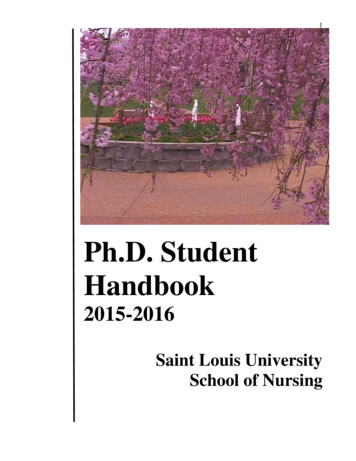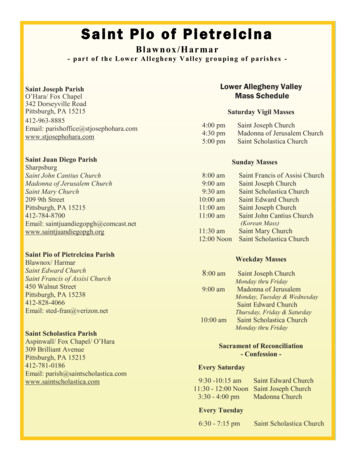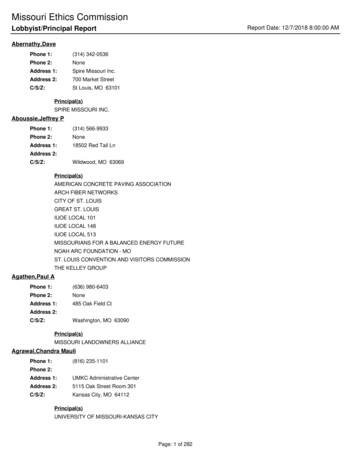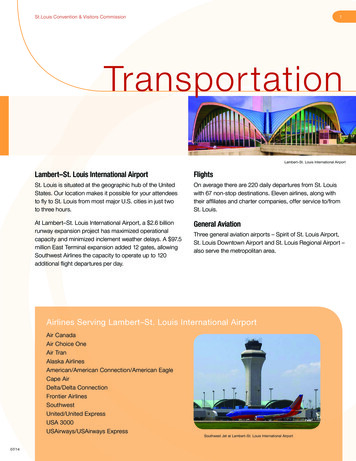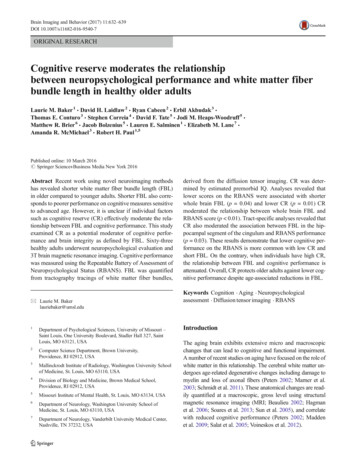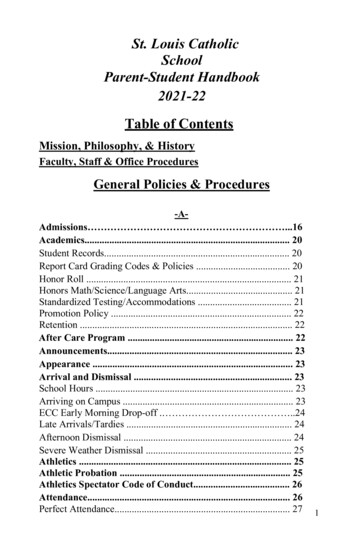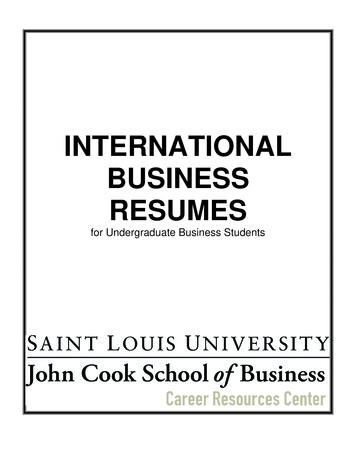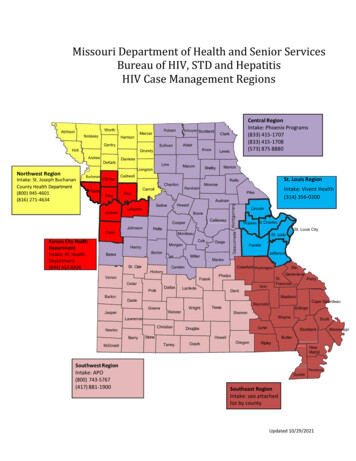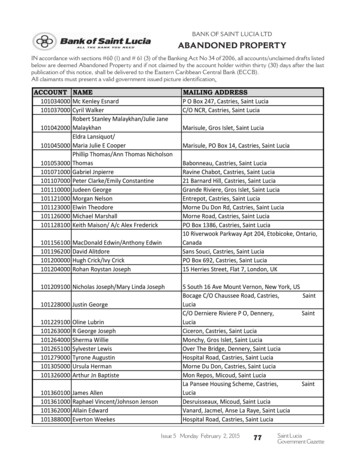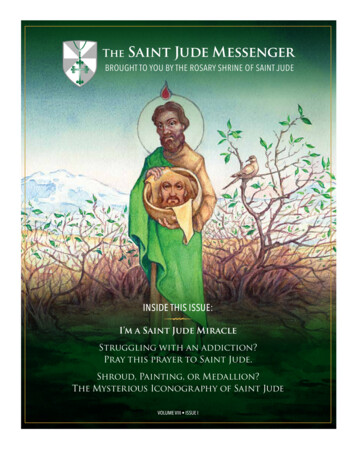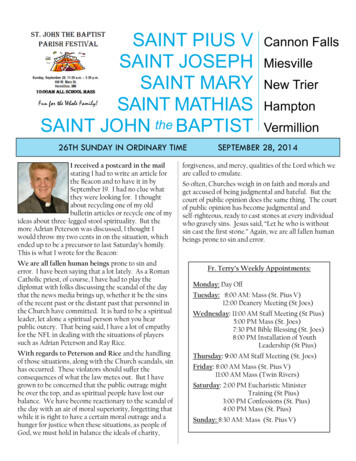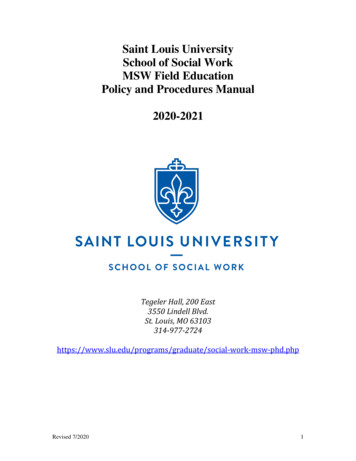
Transcription
Saint Louis UniversitySchool of Social WorkMSW Field EducationPolicy and Procedures Manual2020-2021Tegeler Hall, 200 East3550 Lindell Blvd.St. Louis, MO uate/social-work-msw-phd.phpRevised 7/20201
Table of ContentsField Education Faculty/Staff5I. Introduction6II. School Mission, Goals, and Program Competencies6III. MSW Practicum CompetenciesA.Generalist Foundation CompetenciesB.Advanced Practice Competencies1. Applied Behavioral Analysis Concentration2. Community and Organization Concentration3. Clinical Concentration777778IV. MSW Practicum CurriculumA.Generalist Foundation Practicum (SWRK5841)B.Advanced Practice Concentration Practica(SWRK 5832/5842 and 5833/5843)C.Recommended Courses for Students Interested in PracticaOutside Their Concentration88V. Roles, Responsibilities and Expectations in Field EducationA.Role of the StudentB.Role of the Faculty LiaisonC.Role of Practicum AgenciesD.Role of Field InstructorsE.Role of BCBA SupervisorF.Field Instructor Certificate Program for New Field InstructorsG.Role of Field InstructorsH.Role of the Director of Field EducationI.Role of the Field Education Advisory CommitteeJ.Role of the Faculty Advisors1414151616171717171818VI. Practicum Requirements for Dual Degree ProgramsA.Master in Social Work/Master of Public Health (MSW/MPH)B.Master in Social Work/Master of Arts of Pastoral Studies(MSW/MAPS)C.Master in Social Work/Master of Public Administration(MSW/MPA)D.Master of Social Work/Master of Deaconess StudiesE.Master of Social Work/Master of DivinityF.Master of Social Work/Master of TheologyG.Master of Social Work/Juris Doctor (MSW/JD)1919Revised 7/20209101920202121212
VII. General Practicum Curriculum Policies and Procedures (MSW)A.Eligibility for PracticumB.Hours Required for PracticumC.Counting Hours While “On Call”D.Total Practicum HoursE.Two-Semester Concentration Practicum RequirementsF.Recording Practicum HoursG.Academic CreditsH.Practicum Enrollment OptionsI.Practicum OrientationJ.Practicum PlanningK.Evening and Weekend PracticaL.Integrative Practice SeminarsM.Request for Extension of Due Date for Learning AgreementN.Problems in Practicum/Termination of PracticumO.MSW Practicum at Private PracticeP.Extended Leave from PracticumQ.GradingR.Practicum Start DateS.Appropriate ActivitiesT.Prohibited ActivitiesU.Activities Undertaken with CautionV.Agency Reimbursement for Student ServicesW.Agency PoliciesX.Off-Site Practicum ActivitiesY.Learning Agreement DeadlineZ.Criminal RecordsAA.Background ChecksBB.Verification of Health RecordsCC.Lobbying ActivitiesDD.Sharing Sensitive InformationEE.Safety and Security of Students in PracticumFF.Paid PracticumGG.Place-of-Employment PracticaHH.Liability CoverageII.Reimbursement to AgencyJJ.Distance/International PracticumKK.Ethics StatementLL.Health Insurance Portability & Accountability Act of1996 (HIPAA)MM.Harassment PolicyNN.Compliance with Americans with Disabilities ActOO.Academic Credit for Life or Previous Work ExperiencePP.Mandated ReportingQQ.Conflict of InterestRevised 272727282828292929293031313232323333333333343
VIII. Field Education Resource MaterialsA.Field Education Bulletin BoardB.Field Education WebsiteC.Information Through E-Mail34343434IX. Office of Field Education Resources and FunctionsX. Supervision/Evaluation Suggestions3435Revised 7/20204
FIELD EDUCATION FACULTY AND STAFFBeth Barrett, MSW, LCSWDirector of Field EducationAssociate Clinical ProfessorTegeler Hall, Room 205(314) 977-2723beth.barrett@slu.eduKaren BolingerField Education Administrative Asst.Tegeler Hall, 300 East Suites(314) 977-2724 (Office)(314) 977-2731 (Fax)karen.bolinger@slu.eduGabriel Carrillo, DSW, MSWAssociate Clinical ProfessorField LiaisonTegeler Hall, Room 213314/977-2717gabriel.carillo@slu.eduOFF-SITE LIAISONSMelissa Morgan, MSW, LSCSWAdjunct Field LiaisonSLU MSW @ Avila University(816) 501-3650Melissa.morgan@slu.eduSev Kolysko, MA, MSW, LICSWAdjunct Field LiaisonSLU MSW @ Elms CollegeAnn Trettin, Ph.D., MSW, LISW-SAdjunct Field LiaisonSLU MSW @ Lourdes University(419) 517-8416ann.trettin@slu.eduPamela Huggins, MSW, ACSW, LCSWClinical ProfessorField LiaisonTegeler Hall, Room 305(314) 977-2532pamela.huggins@slu.eduHeather Lewis, MSW, Ed.S., BCBAField Liaison, Applied BehaviorAnalysis (ABA)Assistant Clinical ProfessorAssistant Director, ABA ProgramTegeler Hall, Room 211(314) 977-2712heather.l.lewis@slu.eduJenny Deutsch, MSW, LCSWAdjunct Assistant Clinical ProfessorField LiaisonTegeler Hall, Room 215(314) 977-3359jenny.deutsch@slu.eduRevised 7/20205
SAINT LOUIS UNIVERSITYSCHOOL OF SOCIAL WORKMSW PROGRAMFIELD EDUCATION POLICY AND PROCEDURE MANUAL2020-2021I. INTRODUCTIONWelcome to Field Education! Many students report that field education is the “best part”of social work education. It is considered to be the “signature pedagogy” due to theuniqueness in which students are prepared to become professional social workers. As partof the MSW degree, students will complete 3 practica. “Practica” is a Latin wordmeaning “practical trainings.” In the practica, students will have structured learningagreements that focus on competencies needed for the generalist foundation andadvanced practice. In developing competencies, students will have designated practicebehaviors that include skill and knowledge development, as well as integration of socialwork ethics. In the practica, the emphasis will be on skill development in micro, mezzo,and macro practice, while also having learning through practice behaviors in socialpolicy, human behavior, research, cultural competence, and ethics.The practicum experience involves supervision, training, and mentoring from a qualifiedMSW Field Instructor in an approved social service agency or human serviceorganization. In practica, students will provide social work services and function inmasters level social work positions.Students will have a supportive and helpful relationship for their practica as they workclosely with a Faculty Liaison who has expertise in their area of advanced practice andconcentration. The Faculty Liaison will help with the planning and preparation, designingof learning agreement, visiting at mid-semester, and review work for the final evaluationand grade. In addition, the role is to facilitate quality practicum experiences and assistwith any challenges. Further information on the practicum, the office of field education’spolicy and procedures, and other helpful information follow.II. SCHOOL MISSION, GOALS, AND PROGRAM COMPETENCIESThe School’s mission and goals, and the MSW Program competencies frame theeducation experience throughout the coursework and practica.The School’s mission: Saint Louis University School of Social Work prepares studentsfor professional social work and applied behavior analysis practice with a commitmentto social justice and the empowerment of vulnerable and oppressed populations. TheSchool strives for a dynamic community of learning with excellence in teaching,research, and service.The goals of the School of Social Work are:1. To use knowledge, values, and skills in generalist social work practice.Revised 7/20207
2. To use knowledge, values, and skills in advanced social work and appliedbehavior analysis practice.3. To contribute to the advancement of knowledge of the professions.4. To use skills, talents, and time in pursuit of social justice in the community.III. MASTER OF SOCIAL WORK (MSW) COMPETENCIESA. Generalist Foundation CompetenciesAt the completion of the MSW generalist foundation courses and practicum, studentswill demonstrate the ability to:1.2.3.4.5.6.7.8.9.Demonstrate ethical and professional behaviorEngage diversity and difference in practiceAdvance human rights and social, economic, and environmental justiceEngage in practice-informed research and research-informed practiceEngage in policy practiceEngage with individuals, families, groups, organizations, and communitiesAssess individuals, families, groups, organizations, and communitiesIntervene with individuals, families, groups, organizations, and communitiesEvaluate practice with individuals, families, groups, organizations, andcommunities(adopted from CSWE EPAS, 2015)B. Advanced Practice CompetenciesAs delivered through the concentration coursework and practica, advanced practicecompetencies build on the generalist foundation curriculum. At the completion of theadvanced practice coursework and practica, students will demonstrate the ability to:1) Applied Behavior Analysis Concentration* Construct applied behavior analysis services within the context of responsibleprofessional social work and behavior analysis codes of ethics.* Demonstrate competent applied behavior analysis practice to social work clients.* Provide leadership in addressing social constraints that inhibit the expression of humanfulfillment and human rights, especially regarding diverse and vulnerable populations.* Design and evaluate applied behavior analysis services provided for social work clients.* Functionally analyze the behavior of social work clients within their social context.2) Community and Organization Concentration* Provide leadership in a variety of roles in community and organization practice.* Uses codes of ethics and human rights principles to guide practice with communitiesand organizations.* Approach community and organizational planned change using logical, scientific andtheoretical frameworks.* Demonstrate culturally competent practice with communities and organizations.Revised 7/20208
* Use research and professional expertise to improve practice with communities andorganizations.3) Clinical Concentration* Demonstrate professional behavior consistent with social work values and ethics inclinical practice.* Develop competence in working with diverse families and performing a bio-psychosocial-spiritual assessment.* Use evidence-based social work practice process in clinical work with individuals,families, groups, and larger systems.* Use policy practice approaches to advocate for social policies that enhance clients andclinical service delivery.* Use research and clinical expertise to evaluate client, practice, and program outcomes.IV. MSW PRACTICUM CURRICULUMA. Generalist Foundation Practicum–300 hours-SWRK 5841(ABA–SWRK5821)DescriptionThe Generalist Foundation Practicum provides for skill development in generalist socialwork practice. The competencies and behavioral indicators focus on students gaininggeneralist skills through learning opportunities involving micro, mezzo and macropractice. This practicum serves as the basis for subsequent advanced practiceconcentration practica.Prerequisites1) In order to enroll in SWRK 5841 (ABA- SWRK 5821), Professional FoundationPracticum, students must have previously completed:SWRK 5750 - Social Work Practice with Individuals, Families andGroupsAnd completed or be concurrently enrolled in all other professional foundationcourses:SWRK 5702 - Social PolicySWRK 5725 - Human Behavior and EnvironmentSWRK 5751 - Social Work Practice With Communities and Organizations2) Students are required to take 3 practica, 300 hours each. It is recommended thatthey use at least 2 sites and/or 2 different Field Instructors. Please plan with yourliaisons to insure the best possible learning experience. Advanced standingstudents under the new program will have 2 practica, 300 hours each, at one site.Students completing a specialization are required to take their two-semesterconcentration practica at one site. Students, please make sure you inform yourField Instructor on the correct hours you will be working at their agency.Revised 7/20209
3) The Generalist Foundation Practicum must be completed in an approvedpracticum site within a two-hour driving distance from the School of Social Workto enable the Faculty Liaison to conduct an on-site practicum visit.B. Advanced Practice Concentration PracticaDescriptionThe concentration practica build on the generalist foundation and include competenciesand practice behaviors in the area of concentration.*Prerequisites for Clinical and Community Concentrations (SWRK 5832/5842 and5833/5843 - 300 hours each)Concentration Practicum II, SWRK 5832/5842, may be completed only after the studenthas successfully completed the professional foundation courses (SWRK 5702, SWRK725, SWRK 5750, SWRK 5751, and SWRK 5841/819). The student must also havecompleted or concurrently be enrolled in the appropriate concentration core courses:1) Community and Organization Concentration SWRK 5721—Community Theory and Practice SWRK 5785—Organization Planning and Programming2) Clinical Concentration SWRK 5755—Advanced Clinical Social Work Practice (must be takenconcurrently with SWRK 5842 1st Clinical Concentration Practicum) SWRK 5742—Human Behavior and the Social Environment Part IIAdditional Concentration Practicum Information:1) Practicum III, SWRK 5833/5843, may be completed only after the completion ofPracticum II, SWRK 5832/5842.2) Practicum V, SWRK 5844, is an elective that may be completed at any pointfollowing the completion of SWRK 5841.3) Each concentration has specific competencies and behavioral indicators. PracticaII and III must have a focus consistent with the chosen area of concentration.*Prerequisites for ABA Concentration (SWRK 5822, 5823, and 5824, 333/4 hourseach)Concentration Practicum II, SWRK 5822, may be completed only after the student hassuccessfully completed the professional foundation courses (SWRK 5702, SWRK 5725,SWRK 5750, SWRK 5751, and SWRK 5821). The student must also have completed orconcurrently be enrolled in the appropriate concentration core courses:Applied Behavioral AnalysisSWRK-ABA 5746 Principles and Concepts in Behavior AnalysisRevised 7/202010
Additional Concentration Practicum Information:1) Practicum III, SWRK 5823, may be completed only after the completion ofPracticum II, SWRK 5822.2) Practicum IV, SWRK 5824, may be completed only after the completion ofPracticum III, SWRK 5823.3) Practicum V, SWRK 5825, is an elective that may be completed at any pointfollowing the completion of SWRK 5821.C. Recommended Courses for Students Interested in Practica Outside theirConcentration AreaThe MSW curriculum offers considerable flexibility for MSW students. Students maychoose to complete a practicum that is outside the domain of their chosen concentration.The following chart offers recommendations for coursework for specific types of settings.For example, a student in the family concentration may wish to complete a practicum in ahospital setting. Specific courses in the health and mental health concentration taken aselectives can offer a student the specific information helpful for success in that setting.MSW Courses Recommended for MSW Practica Outside of Chosen ConcentrationLevel ofPracticumType of PracticumSetting and/orServices ProvidedRequiredConcentrationPractica ClinicalSitesHospital: AcuteMedicalAll foundation coursesand the appropriatecourses indicated forstudent’s concentrationHospital:PsychiatricAll foundation coursesand the appropriatecourses indicated forstudent’s concentrationOutpatient MentalHealthAll foundation coursesand the appropriatecourses indicated forstudent’s concentrationStrongly Recommended(Courses that have beencompleted prior to thepracticum or takenconcurrently with thepracticum)SWRK 5755:Social Work Practice in theHealth FieldSWRK 5791:Pharmacology and SocialWorkSWRK 5735:Complementary Approachesto Healing in Social WorkPracticeSWRK 5742:Evidenced-based Practice inCommunity Mental HealthSWRK 5762:Clinical DiagnosisSWRK 5742:Evidenced-based Practice inCommunity Mental HealthSWRK 5744:Revised 7/202011
Community MentalHealthAll foundation coursesand the appropriatecourses indicated forstudent’s concentrationHospiceAll foundation coursesand the appropriatecourses indicated forstudent’s concentrationRehabilitation:Acute Physical orSub acuteAll foundation coursesand the appropriatecourses indicated forstudent’s concentrationAll foundation coursesand the appropriatecourses indicated forstudent’s concentrationCommunity HealthCenterRevised 7/2020Skilled NursingFacilityAll foundation coursesand the appropriatecourses indicated forstudent’s concentrationHome HealthAgencyAll foundation coursesand the appropriatecourses indicated forstudent’s concentrationSubstance AbuseInterventionsSWRK 5762:Clinical DiagnosisSWRK 5742:Evidenced-based Practice inCommunity Mental HealthSWRK 5744:Substance AbuseInterventionsSWRK 5762:Clinical DiagnosisSWRK 5772:Cognitive Behavior Therapyin Social Work PracticeSWRK 5745:Health and Mental HealthInterventions with OlderAdultsSWRK 5755:Social Work Practice in theHealth FieldSWRK 5786:Death, Dying, and GriefSWRK 5755:Social Work Practice in theHealth FieldSWRK 5734:Health and Human BehaviorSWRK 5755:Social Work Practice in theHealth FieldSWRK 5745:Health and Mental HealthInterventions with OlderAdultsSWRK 5755:Social Work Practice in theHealth FieldSWRK 5745:Health and Mental HealthInterventions with OlderAdultsSWRK 5755:Social Work Practice in the12
SchoolsAll foundation coursesand the appropriatecourses indicated forstudent’s concentrationClinical/TherapyAll foundation coursesand the appropriatecourses indicated forstudent’s concentrationTrauma CareConcentrationPracticaCom/Org SitesCommunityOrganizing/FaithBased OrganizingFaith- Based SocialRevised 7/2020All foundation coursesand the appropriatecourses indicated forstudent’s concentrationAll foundation coursesHealth FieldSWRK 5720:School Social WorkSWRK 5760:Behavior Interventions withChildren & AdolescentsSWRK 5808:Social Work, Education, &Individuals withExceptionalitySWRK 5741:Family Interaction UnderStressSWRK 5742:Evidenced-based Practice inCommunity Mental HealthSWRK 5757:Foundations of FamilyPracticeSWRK 5762:Clinical DiagnosisSWRK 5769:Marital/Couples CounselingSWRK 5772:Cognitive Behavior Therapyin Social Work PracticeSWRK 5777:Classic Approaches toFamily PracticeSWRK 5829:Post-Modern Approaches toFamily PracticeSWRK 5773:Trauma CareSWRK 5775:Advanced SW Practice inTrauma with Children andAdolescentsSWRK 5776:Advanced SW Practice inTrauma with AdultsSWRK 5721:Community Theory &PracticeSWRK 5715:13
Ministryand the appropriatecourses indicated forstudent’s concentrationHomeless ServicesAll foundation coursesand the appropriatecourses indicated forstudent’s concentrationAll foundation coursesand the appropriatecourses indicated forstudent’s concentrationAll foundation coursesand SWRK 707 PolicyPractice for ce areasCorrections/JusticesystemIntimate PartnerViolenceAddictionsGlobalRevised 7/2020All foundation coursesand the appropriatecourses indicated forstudent’s concentrationSocial Work Practice withpeople and communitiesexperiencing povertySWRK 5704:Spirituality and Social WorkSWRK 5715:Social Work Practice withFamilies & CommunitiesExperiencing PovertySWRK 5721:Community Theory &PracticeSWRK 5701:Social Justice: HumanLiberation and CommunityBuildingSWRK 5716: Diversity andAnti-Oppression PracticeSWRK 5717: Foundationsof PeacemakingSWRK 5785:Organizational Planning &ProgrammingSWRK 5798:Nonprofit ManagementSWRK 5799:Social EntrepreneurshipSWRK 5828:Fundraising for NonprofitOrganizationsSWRK 5729:Social Work Practice inCorrectionsSWRK 5711: Social Workand the LawSWRK 5744:Substance AbuseInterventionsSWRK 5771: IPV:Contemporary Strategies forSW PracticeSWRK 5703: InternationalSocial Work (Trips: India,Ghana, Cuba)14
SWRK 5705:Practice in Global IssuesVeteransSWRK 5756:Clinical and Public HealthApproaches to Workingwith Veterans and MilitaryFamiliesV. ROLES, RESPONSIBILITIES AND EXPECTATIONS IN FIELD EDUCATIONA. Role of the StudentThe School of Social Work uses a structured self-selection model for practicum selection.In consultation with the assigned Faculty Liaison, students are responsible for securing apracticum site. Students have a wide variety of choices in selecting their practica optionsfrom the school’s approved practicum sites. Students initiate the practicum planningprocess by completing and submitting a “Request for Liaison” form to the Office of FieldEducation through the Field Education page on the School of Social Work Google site.Students will be notified of their assigned Faculty Liaison via an email from the FieldEducation Director after their request has been approved. Students then contact theirFaculty Liaison for a planning appointment. After consulting with the Faculty Liaison,students have the responsibility to follow-up with desired agencies and organizations topursue setting up formal interviews with the professionals who serve as the contactpersons for their agencies. The process is similar to a job search and employmentinterview. Students will need to have a professional résumé and cover letter ready for theprocess. Contacts can be made through emailing or telephoning the listed contact for thespecific practica.Prior to contacting and interviewing, students need to be able to articulate their interestsin the practicum site, their desired learning experiences, and their career goals. Studentsshould have researched the practicum site through reading their website or other on-linematerials to have knowledge of what the agency’s mission, programs, and servicesinclude. During the interview, the Field Instructors may ask about students’ interests incompleting a practicum at the agency, their learning style and needs for supervision, andprevious volunteer or employment background that can provide some experience for thepracticum. Students should also be prepared to ask questions that will provideinformation on learning experiences, preferred times for practica, and style ofsupervision. Students are then able to determine if the practicum is a “fit” for them if theyreceive an offer. Students are free to have as many interviews or offers that they desire tolocate a practicum. It is very important to be professional and respond to all offers. It maybe that the student would like to have one practicum first and so they can negotiate withother offers to have a future practica.The student’s Faculty Liaison is available to provide additional resources or ideas in theRevised 7/202015
process. Once a student has selected an offer, a Confirmation of Practicum form issubmitted through a link provided by the student’s Faculty Liaison. If the student has notconfirmed his/her practicum site with the Faculty Liaison, practicum work hours may notbe counted.Students are required to submit their Learning Agreements to their Faculty Liaison withinthree weeks of the beginning of each semester (due date to be announced in seminar classand posted on the School of Social Work Google site). In addition, the student willdownload the “Practicum Log of Hours” form from the Field Education page on theSchool of Social Work Google Site or from the practicum course Blackboard page torecord their practicum and supervision hours. This log will be given to the FieldInstructor to approve at the completion of the practicum hours and then turned in to theFaculty Liaison via the practicum course Blackboard page. Students will work with theirField Instructors to complete their final evaluation as well.Students are also expected to contact their Faculty Liaison as soon as any concernsshould arise in the practicum.Students are expected to follow the policies and procedures of the following: Office of Field Education Practicum Agency NASW Code of Ethics (students will sign a pledge of ethical conduct in theirgeneralist foundation and advanced practice integrative seminars)B. Role of the Faculty LiaisonThe Faculty Liaison serves as the “professor” for the practicum courses. The FacultyLiaison is ultimately responsible for the grading of the practicum. The Faculty Liaisonprovides the on-going linkage between the student, agency, and school. The FacultyLiaison has the following key roles:1) Planning: In planning, Faculty Liaisons meet and assist students in preparing andplanning for practica through reviewing the practicum process, reviewingresumes, practicing interviewing skills, and providing referrals on possiblepracticum sites that meet the students interests and learning needs. The FacultyLiaison will also work with the Director of Field Education in approving any newpracticum sites, Field Instructors, or place-of-employment practica. FacultyLiaisons, along with the Director of Field Education, have the discretion todetermine the readiness of a student for practicum.2) Monitoring: In monitoring, the Faculty Liaison assists, reviews, and approvesstudents’ learning agreements. In addition, the Liaison is available to the studentor Field Instructor at any time should concerns arise.3) Evaluating: In evaluating, the Faculty Liaison will set up a mid-semester visitwith the student, Task Instructor and Field Instructor to review the student’spracticum experience and progress in meeting the learning agreement behavioralindicators. The Liaison visits primarily to support and advocate for a qualitylearning experience. In addition, the Liaison will be involved in any specialconcerns or performance issues that might arises and has the final responsibilityRevised 7/202016
of assigning a grade after reviewing the Field Instructor’s ratings on the finalevaluation and recommendation.C. Role of the Practicum AgenciesAgencies and organizations that are approved as practicum sites for the School of SocialWork have agreed to the following:1) Partner with the School of Social Work to provide quality practicum experiencesfor SLU students.2) Adhere to recognized standards and evidenced–based social work practice and bein good standing within the professional community.3) Provide a MSW degreed professional who is a staff member, board member,volunteer or officially affiliated with the agency that will provide supervision forthe student.4) Create a climate for student learning with a range of appropriate learningexperiences for students.5) Provide support and resources that enables the Field Instructor(s) to complete theSt. Louis Collaborative’s Field Instructor Certification Program within a two-yearperiod.6) Regularly update collaborative on-line database for their agency and FieldInstructors and provide the school with a signed affiliation agreement.D. Role of Field InstructorsField Instructors that are approved for field instruction for students have agreed to thefollowing:1) Partner with the School of Social Work to serve as a Field Instructor.2) Verify that they have a Master of Social Work degree from a CSWE-accreditedschool by completion of a profile in the St. Louis Field Education CollaborativeDatabase.3) Verify that they have at least two years of successful practice in social workfollowing completion of the degree through their profile.4) Verify their employment history at the agency for at least one year through theprofile.5) Serve as a teacher, mentor, and supervisor for students.6) Meet with the student for a minimum of one hour per week of face-to-facesupervision.7) Commit to completing the Field Instructor Certification Program as a new FieldInstructor within a two-year period.8) Demonstrate ethical practice and be in good standing with the professionalcommunity.9) Provide a quality learning experience appropriate to the student’s level inpracticum.10) Assist in development and approval of the student’s learning agreement.11) Perform timely final evaluation and grade recommendation at the end of thestudent’s practicum.12) Contact the Faculty Liaison at anytime for concerns or resources.Revised 7/202017
13) Nominate students for “Outstanding Practicum Student” when indicated.14) In the rare situation where the Field Instructor is not “affiliated” with the agency,the agency is required to provide permission and support for an outside MSW toprovide field instruction.E. Role of BCBA SupervisorMSW students who choose the ABA concentration spend their concentration practicaunder the guidance of a BCBA Supervisor. The following criteria, established by theSchool of Social Work, are used by the ABA Program in selecting Applied BehaviorAnalysts to serve as BCBA Supervisors at affiliated agencies:a) Board Certified Behavior Analyst in good standing, orb) Approved University Experience: A faculty member who has been approved bythe BACB as a Supervisor in the university’s approved course sequence.c) And the supervisor has met one of the two requirements above and also hascompleted the required supervision standards set forth by the BACB BCBA Supervisors are not required to attend the Certified Field Instructor trainingrequired for Field Instructors, because of their BACB certification.F. Field Instruction Certification Program for New Field InstructorsSaint Louis University partners with Washington University in St. Louis, University ofMissouri-St. Louis (UMSL) and Fontbonne University as members of the “St. LouisField Education Collaborative.” The Collaborative provides the on-going database ofapproved practicum agencies and Field Instructors and provides orientation and advancededucation sessions for Field Instructors to become “Certified Field Instructors.” Thistraining is designed to provide an on-going focus on the provision of quality fieldinstruction for students in the St. Louis metropolitan and nearby communities. All newerField Instructors (since 2007) are required to complete these sessions within a two-yearperiod. http://www.fieldedu.com/G. Role of Task InstructorsA Task Instructor is an agency-based professional who has a master’s degree in anotherfield or has a Master of Social Work, but is not yet eligible to serve as the MSW FieldInstructor. Task Instructors serve as day-to-day supervisors and, in conjunction with aMSW Field Instructor, will assist and approve the learning agreement, pa
Jenny Deutsch, MSW, LCSW Adjunct Assistant Clinical Professor Field Liaison Tegeler Hall, Room 215 (314) 977-3359 jenny.deutsch@slu.edu OFF-SITE LIAISONS Melissa Morgan, MSW, LSCSW Adjunct Field Liaison SLU MSW @ Avila University (816) 501-3650 Melissa.morgan@slu.edu Sev Kolysko, MA, MSW, LICSW Adjunct Field Liaison SLU MSW @ Elms College
